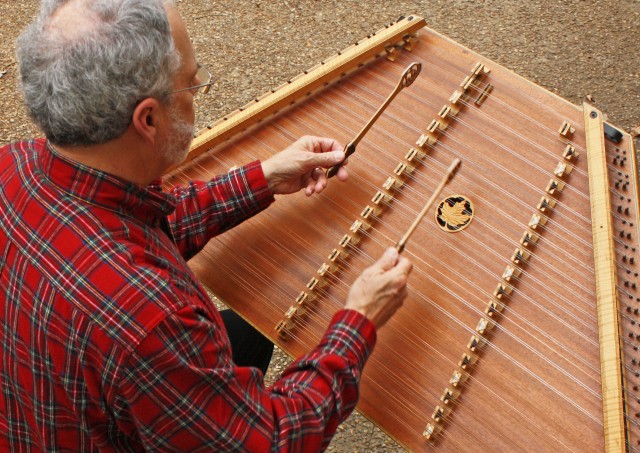As I play music, or as people listen to my recordings, I am continually startled by the vast range of comments I get. Disregard the negative ones --- let’s even just consider the spectrum of compliments!
I’ll be pounding my hammers on the dulcimer in a dark minor key using dramatic chord changes and then I shift to a jarringly different key and an even more passionate and animated progression of what I consider to be compelling and powerful musical expressions and ideas. Often at a time like this someone will come up and say, “This beautiful music is so soothing and relaxing, I could just fall asleep to it.”
Yow! How could others seem to be having such a strikingly different experience? I want to move their souls and shake their lives with profound realities, and they take it as a sweet, entertaining scene of musical wallpaper….
Here are some simple observations first: 1) The hammered dulcimer rings a lot more than a pop-rock band’s instruments; 2) my banging is a smaller part of the overall sound than, say, a kick drum; 3) they are not listening from as close or as centered a location as I am, so the sound is probably smoothing out as it gets to their ears; 4) my choices of chords and lyrical melodies are more emotionally affirming than the typical gritty pop-rock approach.
Certainly these elements do come into play.
But I think there are various other factors. Well, for one thing, I think our culture tends to promote music as a utilitarian entity, without inherent value --- that is, instrumental music, (and often sung music, for that matter) is intended to create a backdrop, a kind of wallpaper, for our lives. We hear it everywhere we go, and it helps us feel that our lives are flowing along through time in a logical or pleasant way, and it provides the mood and meter for our dancing, and it draws us into a movie’s development, and it helps us feel the value of an advertised product on television, and it prepares our hearts for the church sermon, and it keeps us from feeling lonely or sad, and it provides an appropriate celebratory moment in a wedding, and in a concert it provides a special social experience for the fans, and it shows party guests that the host by choosing especially well is himself special.
In all settings like these, the music is subservient to the context: Its primary value is defined by what it is useful for and expected to do. (There’s nothing inherently wrong with any of this, really.)
So perhaps people look for function and entertainment value first, and the idea of “relaxation” is an extension of that expectation?
And is there a sort of prejudice that requires instrumental music to take a lower, more humble and servile role in people’s lives, not having a life of its own? (Funny, though, that much vocal music has little expectation of a meaningful message in the words, and often listeners don’t even think about the lyrics.)
Or is it a matter of vocabulary? Is the listener feeling something really significant and she quickly snatches for a word to represent her heart’s stirring --- and for some reason the word “soothing” seems right to her at this moment’s notice?
And I think each of our brains is wired for music quite differently. A person at one end of a range of intricacy may have always taken music lightly and not developed the complex neural pathways very much, so music is processed as a simpler texture of meaning in the brain. I find myself at the other end of that spectrum, having been actively working with music in my mind since I was a baby long ago, and the art never stops its intriguing, complex counterpoint of a journey in my head; my performance and composition of music listens to that narrative as it careens along, but my listeners happen to receive the sounds through a very great variety of neural frameworks.
I have more to say about these ideas of communication, structure, meaning, value, and perception, but let’s leave that for later blog entries!
A final anecdote illustrates this range of perception: I love to listen to Classical music, largely because of the enormous complexity in its developing lines that propels my soul to exultation and worship; and among the more accessible sets of Classical pieces are Bach’s six Brandenburg Concertos. I think everyone should love their gorgeous and thrilling weaving of perfect, profound joy! So I play a favorite recording for a friend (perhaps Helmuth Rilling’s version), and he remarks how “calming” it is… Huh? Just then another friend, a much more intensely sensitive one, comes in and asks me to turn off such “frantic cacophony”!
Are we aware of how our own perceptions of music fit into the overall range --- especially in relation to friends and associates?





Comments